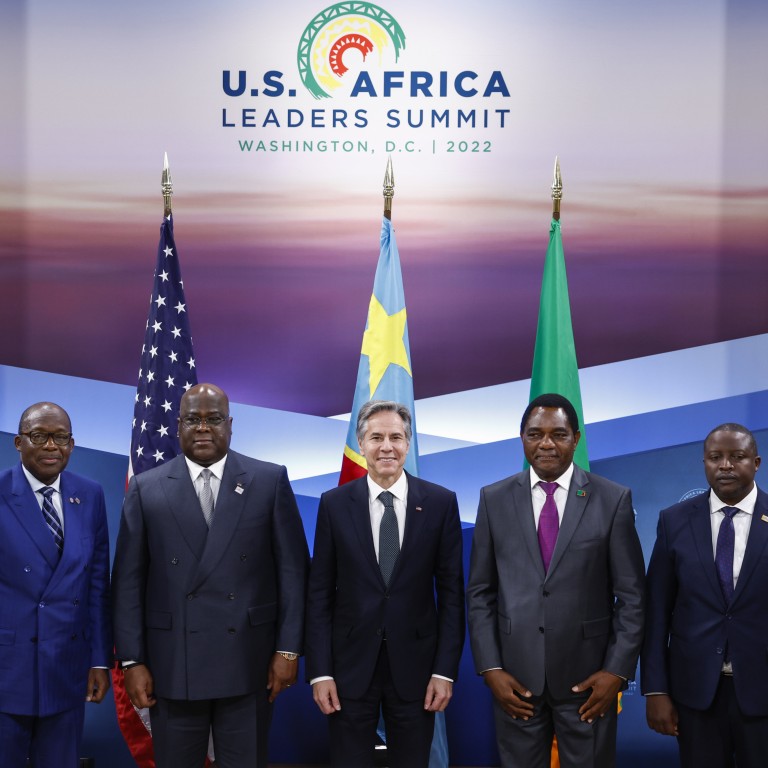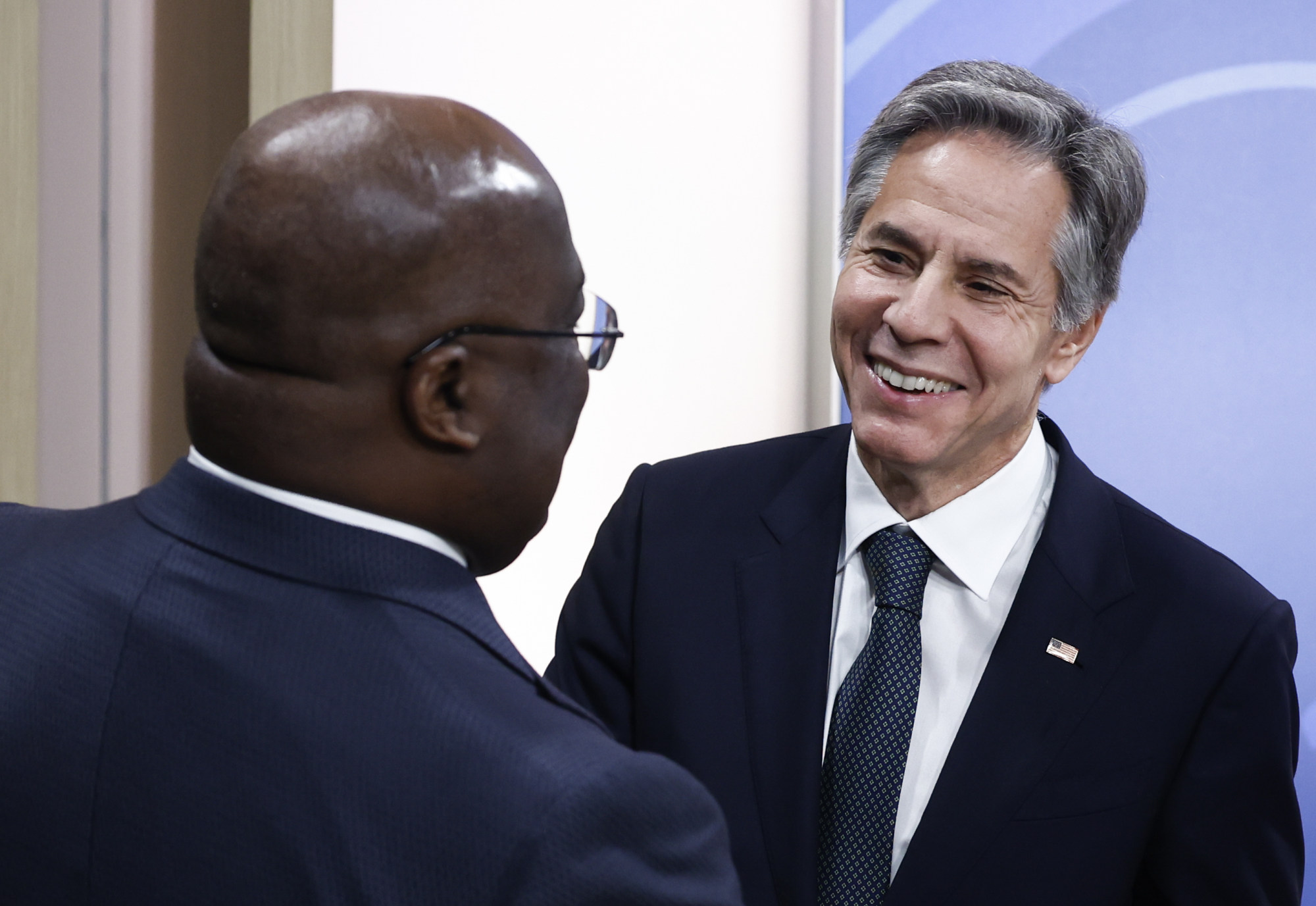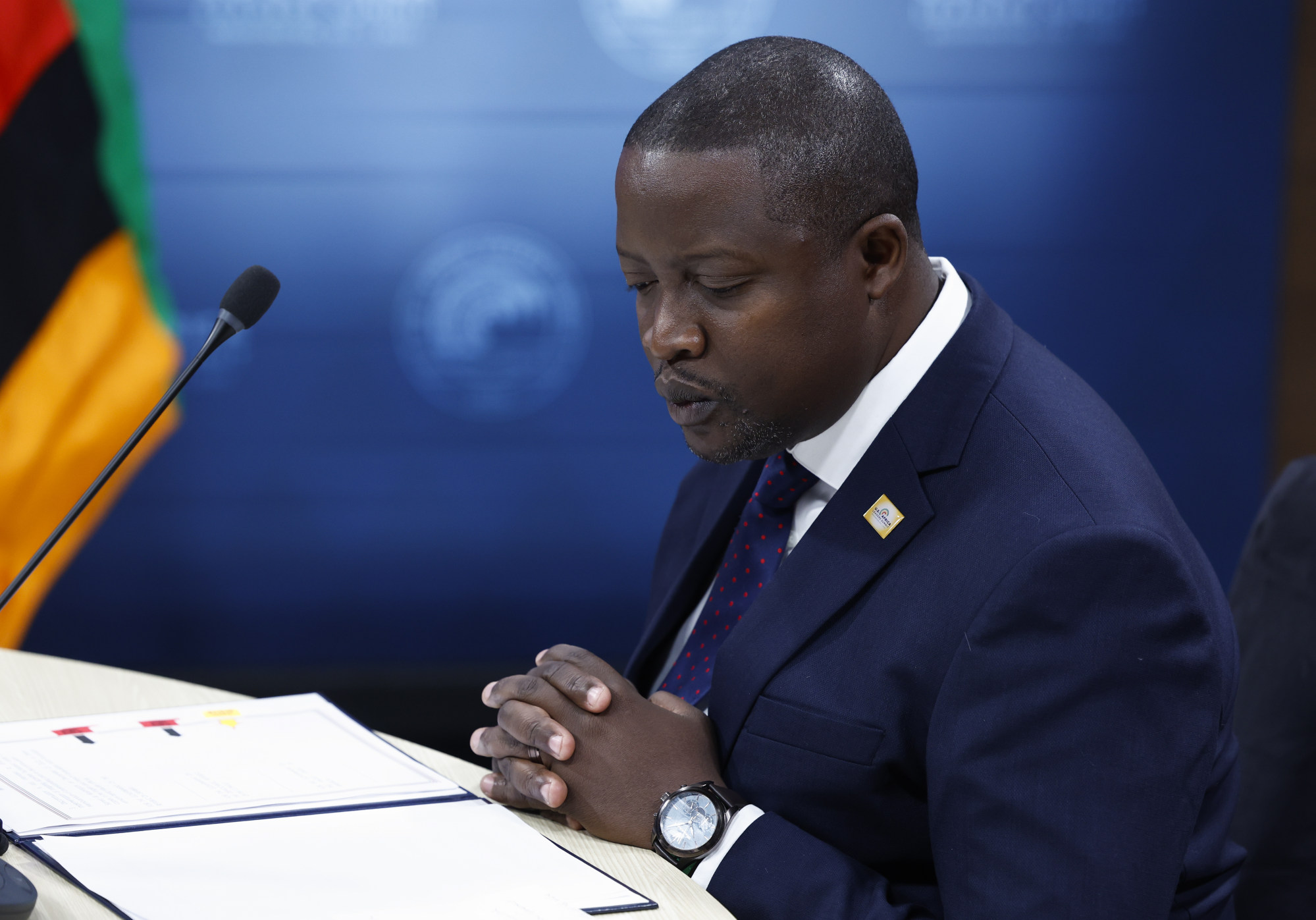
US steps into ‘Middle East of renewables era’ – and direct competition with China
- Washington has signed a memorandum of understanding with the DRC and Zambia to help develop their electric vehicle battery value chains
- Beijing has vast mining investments in the African nations, and renewed US focus in the region ‘will make it a battleground’, critical metals supplier says
America will help the Democratic Republic of the Congo and Zambia develop their electric vehicle battery value chains – a move set to stir up competition with China for minerals essential to the green energy transition.
The resource-rich African nations have signed a memorandum of understanding with the United States to bring funding and expertise into their mining industries.
At the signing ceremony in Washington on Tuesday, Secretary of State Antony Blinken said the US Agency for International Development, commerce department and Trade and Development Agency would provide technical assistance for electric vehicle supply chains in the two countries.

He said the Export-Import Bank of the United States and the International Development Finance Corporation would also explore financing and support mechanisms for investment in African electric vehicle value chains.
DRC President Félix Tshisekedi said the US was at the forefront of processing strategic products and strategic minerals, and that “the DRC has a lot of these minerals”.
“So we are ready to talk about a win-win partnership with the possibility of transforming these minerals in the DRC to create a value chain which will lead to the creation of thousands of jobs,” he said at the ceremony, held on the sidelines of the US-Africa Leaders Summit.
Zambian President Hakainde Hichilema also attended the ceremony. Stanley Kakubo, Zambia’s foreign minister, said the signing of the MoU “fits into a programme of us industrialising our countries, and also providing jobs, and also creating value chains for what we want to do in our country”.
“This is something that we want to actualise in a hurry. We want to get the transactions done and the setting up of the plants quickly, and the value chains must be clear for our mutual benefit,” Kakubo said.

Among the deals signed during the summit, US start-up KoBold Metals, backed by a coalition of billionaires including Bill Gates and Jeff Bezos, announced a US$150 million investment to explore and develop Zambia’s Mingomba copper-cobalt mine – said to be the world’s highest-grade undeveloped large deposit of the metal.
The US entry into the electric vehicle metals race in the DRC and Zambia puts Washington in direct competition with Beijing, which has vast mining investments in the two countries.
The DRC is by far the world’s largest producer of cobalt, accounting for about 70 per cent of global production. It is also rich in diamonds, gold, copper, tin, tantalum and lithium. The DRC is also the largest copper producer in Africa. Zambia, meanwhile, is the world’s sixth-largest copper producer and the second-largest producer of the metal in Africa.
China sources 60 per cent of its cobalt needs from the DRC. Cobalt is an essential component of batteries for electric vehicles, smartphones, tablets and laptops.
Why Africa is critical to China’s electric vehicle race with the West
Lauren Johnston, a China-Africa researcher at the South African Institute of International Affairs, said the deal with the US was a way of stepping into the renewable minerals markets around China.
“China is mostly just buying raw materials … so if the US can step in with some value added, maybe that gives it a strategic advantage in terms of accessing the minerals supply,” Johnston said.
She described Zambia and the DRC as “home to the oil of renewables … it’s the Middle East of the renewables era”.
China has a head start in the processing of these minerals and also in batteries production, according to Johnston.
“So it’s going to be hard for the US to catch up with the production angle. The only advantage is perhaps that it will be cheaper for the US to produce in those countries … than in the USA, and it is cheaper for China to produce in China,” she said. “But let’s see how the US companies overcome all the logistical constraints to actually setting up that production.”
Johnston said the deal with the US might inspire Chinese companies to do the same faster because of how they operate. “Some of the related companies are state-owned and they already have more of a regional presence and a stronger foothold in those industries too,” she said.
China – the reluctant debt relief leader in a debt-distressed world
As the world’s largest lithium-ion battery maker, China’s relationship with the DRC is arguably indispensable, but Tshisekedi’s government believes it may be getting short-changed by foreign mining firms – and is investigating whether unfair contracts were signed during the previous administration.
The DRC last year formed a commission to determine and assess mineral resources, proven and probable mining reserves at the Tenke Fungurume Mining (TFM) copper and cobalt project, which is majority-owned by China Molybdenum. This would help determine the true value of the government’s shareholding through its state-owned miner La Générale des Carrières et des Mines (Gecamines), which currently has a 20 per cent stake in TFM.
Tenke Fungurume Mining is majority-owned by China Molybdenum – it bought the controlling stake in 2016 from US company Freeport-McMoRan.
One of the biggest deals signed under Tshisekedi’s predecessor Joseph Kabila was in 2008, when Gecamines formed the joint venture Sicomines with a consortium of Chinese firms led by Sinohydro and China Railway Engineering Corporation to develop a copper and cobalt mine.
China Eximbank then awarded Sicomines two credit lines totalling US$6.2 billion for the development of the mine and public infrastructure projects. The DRC agreed to pay back the funding with future copper and cobalt output from the project – or what is known as resource-backed loans.
Other Chinese companies operating in the DRC include Huayou Cobalt, Chengtun Mining, Wanbao and China Nonferrous Metal Mining.
US must ‘play catch-up’ to China’s investment in Africa, commerce official says
Zayn Kalyan, chief executive and director of Infinity Stone Ventures, a supplier of critical metals being used in clean energy, said deposits found in the DRC and Zambia were high-grade and economical to mine, as well as being the least environmentally disruptive to mine.
“China has invested heavily in exploiting the resources in this region over the past 20 years, however their approach and business practices in the region have not been received well and have been met with hostility,” Kalyan said.
He said as the US and other Western nations move away from China and build their own battery metal supply chains, they have turned to the Central African region as a key source for these minerals.
“The renewed US focus on the region will make it a battleground in the growing trend of decoupling between the US and China as competition between the two superpowers increases,” Kalyan said.
“There is an apparent preference of DRC and Zambia to deal with US companies, however the Chinese have an entrenched foothold in the region that will be difficult to disrupt.”

